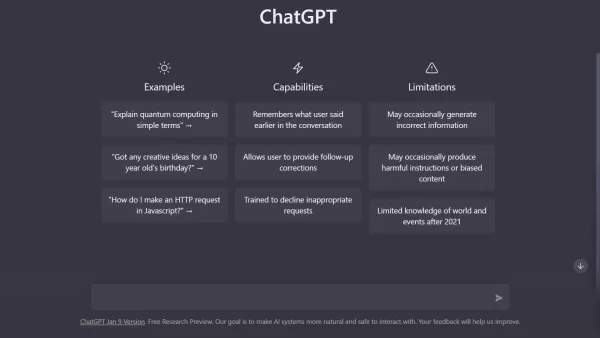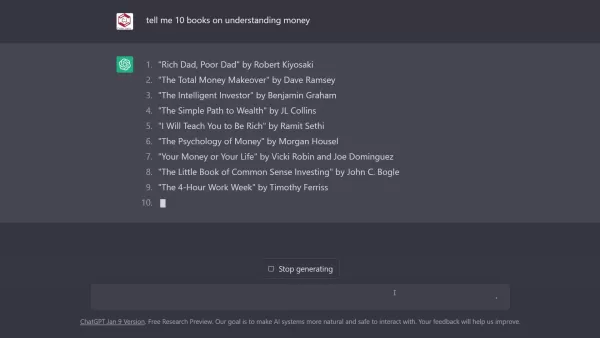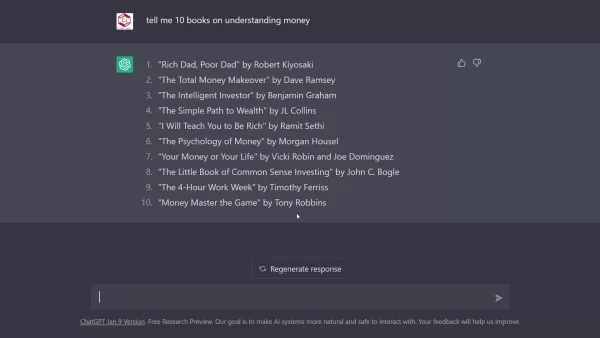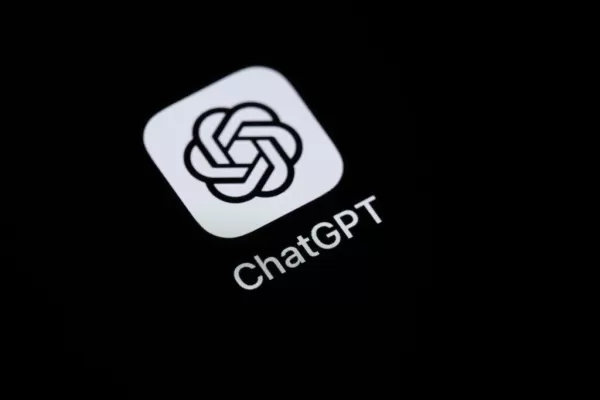ChatGPT and Books: Using AI to Unlock Literary Insights and Summaries
Artificial intelligence is revolutionizing how we engage with literature, and ChatGPT stands out as a particularly versatile tool for book lovers. Whether you're looking for quick summaries, personalized book suggestions, or deep dives into literary analysis, ChatGPT can enrich your reading experience. Let's explore how this AI can transform your literary journey.
Understanding ChatGPT's Literary Capabilities
What is ChatGPT and How Can It Help With Books?
ChatGPT, an advanced AI developed by OpenAI, excels at understanding and generating human-like text. This makes it incredibly useful for anyone interested in books. It can quickly summarize novels, suggest new reads based on your tastes, and even dissect literary themes and characters. For instance, if you're curious about a book but short on time, ChatGPT can provide a summary that captures the essence of the plot, characters, and themes, helping you decide if it's worth a deeper dive.
Imagine you're interested in a book but unsure if it's for you. You could ask ChatGPT to summarize it, and in moments, you'd have a clear picture of the story. It's like having a personal assistant who's read everything and can give you the highlights!

Summarizing Books with ChatGPT
In our busy lives, finding time to read can be tough. That's where ChatGPT's ability to summarize books comes in handy. Just type in a book title and ask for a summary, and you'll get a concise overview that hits the key points. Take *Pride and Prejudice* by Jane Austen, for example. Ask ChatGPT to summarize it, and you'll get a snapshot of Elizabeth Bennet and Mr. Darcy's journey from prejudice to love.
These summaries aren't meant to replace the joy of reading the entire book, but they're perfect for helping you decide which books to spend time on. Whether it's fiction, non-fiction, or academic texts, ChatGPT can give you a quick peek at what's inside.
Getting Book Recommendations from ChatGPT
Finding new books that resonate with your interests can be thrilling, and ChatGPT makes it easier. By sharing your reading history or preferences, you can get tailored recommendations. Say you're into sci-fi with strong female protagonists, like *The Hunger Games* or *Divergent*. ChatGPT might suggest *The Handmaid's Tale* by Margaret Atwood or *Ancillary Justice* by Ann Leckie, based on similar themes and styles.
You could also ask for books similar to one you've loved, like *The Martian* by Andy Weir. ChatGPT might recommend *Project Hail Mary* by the same author or *Seveneves* by Neal Stephenson. It's like having a book-loving friend who knows your tastes inside out.
Analyzing Literature with ChatGPT
Beyond summaries and recommendations, ChatGPT can delve into literary analysis. Whether you're a student, teacher, or avid reader, it can help you explore themes, characters, and literary devices in depth. For example, ask about the themes in *Hamlet* by William Shakespeare, and ChatGPT might discuss revenge, mortality, and madness, backed by textual evidence.
Interested in character development? Ask about Jay Gatsby in *The Great Gatsby* by F. Scott Fitzgerald, and ChatGPT can trace his journey from mystery to tragedy. It can also highlight literary devices like symbolism in *Moby-Dick* by Herman Melville, pointing out the white whale's representation of nature's unattainable forces.
Using ChatGPT for literary analysis can truly enhance your appreciation of books, offering new insights and connections.
ChatGPT for Understanding Money and Romance
Books for Understanding Money with ChatGPT
ChatGPT's knowledge isn't limited to literature; it can also guide you through practical topics like personal finance. If you're looking to boost your money management skills, ChatGPT can recommend books and summarize their key points. Ask for books on understanding money, and you might get suggestions like *Rich Dad Poor Dad* by Robert Kiyosaki, *The Total Money Makeover* by Dave Ramsey, and *The Intelligent Investor* by Benjamin Graham.

*Rich Dad Poor Dad* encourages a shift from working for money to making money work for you, focusing on asset investment. *The Total Money Makeover* offers a step-by-step plan for debt reduction and financial planning. *The Intelligent Investor* is a classic on value investing, guiding readers through the stock market's complexities.
These summaries can help you choose books that align with your financial goals, saving you time and effort in your learning journey.
Romantic Books with ChatGPT
For those who love a good love story, ChatGPT can suggest some of the most heart-warming romantic novels. Based on your preferences, it might recommend books like *The Notebook* by Nicholas Sparks, which explores enduring love across decades, or *The Fault in Our Stars* by John Green, a poignant tale of young love amidst illness.

Another suggestion could be *Me Before You* by Jojo Moyes, a story about love and sacrifice between a caretaker and her quadriplegic charge. With these summaries, you can dive into the world of romance and find stories that resonate with you.
Addressing ChatGPT's Limitations
While ChatGPT is incredibly helpful, it's not perfect. It can sometimes provide incorrect information or biased content, and its knowledge of events stops around 2021. When using it for literary exploration, it's wise to cross-reference its insights with other sources to ensure accuracy. Remember, ChatGPT doesn't think; it generates responses based on patterns in existing text, so it won't offer personal opinions.
Step-by-Step Guide on Using ChatGPT for Literary Exploration
- Access ChatGPT: Head to the OpenAI website, log in, and start exploring.
- Input Your Query: Clearly state what you want—whether it's a summary, recommendation, or analysis.
- Review and Evaluate the Output: Read and assess the response, refining your query if needed.
- Cross-Reference and Verify: Use other sources to check the accuracy of the information provided.
ChatGPT for Books: Pros and Cons
Pros
- Quickly provides book summaries, saving time.
- Offers personalized book recommendations.
- Assists in literary analysis, enhancing understanding.
- Provides insights into practical topics like finance.
- Convenient for exploring and discovering new books.
Cons
- Can generate incorrect or biased information.
- Limited knowledge of post-2021 events.
- Summaries and analyses don't replace reading the book.
- Recommendations may not always match personal tastes perfectly.
- Relies on existing data, which may contain biases.
Frequently Asked Questions
Can ChatGPT replace reading the actual book?
No, ChatGPT's summaries and analyses are tools to help you decide which books to read and to enhance your understanding, not to replace the experience of reading the full text.
Is ChatGPT always accurate?
No, it can sometimes provide incorrect or biased information. It's important to critically evaluate and verify its responses.
How can I improve the quality of ChatGPT's recommendations?
By providing detailed information about your reading history and preferences, you can get more accurate and personalized recommendations.
Can ChatGPT help with academic research?
Yes, it can assist with summaries and analysis, but always cross-reference with scholarly sources to ensure accuracy.
Related Questions
What other AI tools can help with reading and literature?
Tools like Grammarly can improve your writing, ProWritingAid offers editing and proofreading, and Sudowrite assists with creative writing. These AI tools can enhance various aspects of your literary experience, from comprehension to composition.
How can I use AI to improve my own writing?
AI tools like Grammarly and ProWritingAid can help by correcting grammar, spelling, and punctuation, while also suggesting improvements in style and clarity. Sudowrite can aid in generating ideas and crafting narratives, making it a valuable resource for writers.
Related article
 Mastercard’s Agent Pay Enhances AI Search with Seamless Transactions
Traditional search platforms and AI agents often require users to switch windows to complete purchases after finding products or services.Mastercard is revolutionizing this process by embedding its pa
Mastercard’s Agent Pay Enhances AI Search with Seamless Transactions
Traditional search platforms and AI agents often require users to switch windows to complete purchases after finding products or services.Mastercard is revolutionizing this process by embedding its pa
 OpenAI Commits to Fixes After ChatGPT's Overly Agreeable Responses
OpenAI plans to revise its AI model update process for ChatGPT after an update caused excessively sycophantic responses, prompting widespread user feedback.Last weekend, following an update to GPT-4o,
OpenAI Commits to Fixes After ChatGPT's Overly Agreeable Responses
OpenAI plans to revise its AI model update process for ChatGPT after an update caused excessively sycophantic responses, prompting widespread user feedback.Last weekend, following an update to GPT-4o,
 OpenAI Unveils Advanced AI Reasoning Models, o3 and o4-mini
OpenAI introduced o3 and o4-mini on Wednesday, new AI models engineered to pause and analyze questions before answering.OpenAI touts o3 as its most sophisticated reasoning model yet, surpassing prior
Comments (1)
0/200
OpenAI Unveils Advanced AI Reasoning Models, o3 and o4-mini
OpenAI introduced o3 and o4-mini on Wednesday, new AI models engineered to pause and analyze questions before answering.OpenAI touts o3 as its most sophisticated reasoning model yet, surpassing prior
Comments (1)
0/200
![AnthonyScott]() AnthonyScott
AnthonyScott
 August 11, 2025 at 2:20:39 AM EDT
August 11, 2025 at 2:20:39 AM EDT
ChatGPT sounds like a book nerd's dream! Summaries and analysis on demand? I’m sold. But I wonder if it’ll ever capture the vibe of flipping through a worn paperback. 📚


 0
0
Artificial intelligence is revolutionizing how we engage with literature, and ChatGPT stands out as a particularly versatile tool for book lovers. Whether you're looking for quick summaries, personalized book suggestions, or deep dives into literary analysis, ChatGPT can enrich your reading experience. Let's explore how this AI can transform your literary journey.
Understanding ChatGPT's Literary Capabilities
What is ChatGPT and How Can It Help With Books?
ChatGPT, an advanced AI developed by OpenAI, excels at understanding and generating human-like text. This makes it incredibly useful for anyone interested in books. It can quickly summarize novels, suggest new reads based on your tastes, and even dissect literary themes and characters. For instance, if you're curious about a book but short on time, ChatGPT can provide a summary that captures the essence of the plot, characters, and themes, helping you decide if it's worth a deeper dive.
Imagine you're interested in a book but unsure if it's for you. You could ask ChatGPT to summarize it, and in moments, you'd have a clear picture of the story. It's like having a personal assistant who's read everything and can give you the highlights!

Summarizing Books with ChatGPT
In our busy lives, finding time to read can be tough. That's where ChatGPT's ability to summarize books comes in handy. Just type in a book title and ask for a summary, and you'll get a concise overview that hits the key points. Take *Pride and Prejudice* by Jane Austen, for example. Ask ChatGPT to summarize it, and you'll get a snapshot of Elizabeth Bennet and Mr. Darcy's journey from prejudice to love.
These summaries aren't meant to replace the joy of reading the entire book, but they're perfect for helping you decide which books to spend time on. Whether it's fiction, non-fiction, or academic texts, ChatGPT can give you a quick peek at what's inside.
Getting Book Recommendations from ChatGPT
Finding new books that resonate with your interests can be thrilling, and ChatGPT makes it easier. By sharing your reading history or preferences, you can get tailored recommendations. Say you're into sci-fi with strong female protagonists, like *The Hunger Games* or *Divergent*. ChatGPT might suggest *The Handmaid's Tale* by Margaret Atwood or *Ancillary Justice* by Ann Leckie, based on similar themes and styles.
You could also ask for books similar to one you've loved, like *The Martian* by Andy Weir. ChatGPT might recommend *Project Hail Mary* by the same author or *Seveneves* by Neal Stephenson. It's like having a book-loving friend who knows your tastes inside out.
Analyzing Literature with ChatGPT
Beyond summaries and recommendations, ChatGPT can delve into literary analysis. Whether you're a student, teacher, or avid reader, it can help you explore themes, characters, and literary devices in depth. For example, ask about the themes in *Hamlet* by William Shakespeare, and ChatGPT might discuss revenge, mortality, and madness, backed by textual evidence.
Interested in character development? Ask about Jay Gatsby in *The Great Gatsby* by F. Scott Fitzgerald, and ChatGPT can trace his journey from mystery to tragedy. It can also highlight literary devices like symbolism in *Moby-Dick* by Herman Melville, pointing out the white whale's representation of nature's unattainable forces.
Using ChatGPT for literary analysis can truly enhance your appreciation of books, offering new insights and connections.
ChatGPT for Understanding Money and Romance
Books for Understanding Money with ChatGPT
ChatGPT's knowledge isn't limited to literature; it can also guide you through practical topics like personal finance. If you're looking to boost your money management skills, ChatGPT can recommend books and summarize their key points. Ask for books on understanding money, and you might get suggestions like *Rich Dad Poor Dad* by Robert Kiyosaki, *The Total Money Makeover* by Dave Ramsey, and *The Intelligent Investor* by Benjamin Graham.

*Rich Dad Poor Dad* encourages a shift from working for money to making money work for you, focusing on asset investment. *The Total Money Makeover* offers a step-by-step plan for debt reduction and financial planning. *The Intelligent Investor* is a classic on value investing, guiding readers through the stock market's complexities.
These summaries can help you choose books that align with your financial goals, saving you time and effort in your learning journey.
Romantic Books with ChatGPT
For those who love a good love story, ChatGPT can suggest some of the most heart-warming romantic novels. Based on your preferences, it might recommend books like *The Notebook* by Nicholas Sparks, which explores enduring love across decades, or *The Fault in Our Stars* by John Green, a poignant tale of young love amidst illness.

Another suggestion could be *Me Before You* by Jojo Moyes, a story about love and sacrifice between a caretaker and her quadriplegic charge. With these summaries, you can dive into the world of romance and find stories that resonate with you.
Addressing ChatGPT's Limitations
While ChatGPT is incredibly helpful, it's not perfect. It can sometimes provide incorrect information or biased content, and its knowledge of events stops around 2021. When using it for literary exploration, it's wise to cross-reference its insights with other sources to ensure accuracy. Remember, ChatGPT doesn't think; it generates responses based on patterns in existing text, so it won't offer personal opinions.
Step-by-Step Guide on Using ChatGPT for Literary Exploration
- Access ChatGPT: Head to the OpenAI website, log in, and start exploring.
- Input Your Query: Clearly state what you want—whether it's a summary, recommendation, or analysis.
- Review and Evaluate the Output: Read and assess the response, refining your query if needed.
- Cross-Reference and Verify: Use other sources to check the accuracy of the information provided.
ChatGPT for Books: Pros and Cons
Pros
- Quickly provides book summaries, saving time.
- Offers personalized book recommendations.
- Assists in literary analysis, enhancing understanding.
- Provides insights into practical topics like finance.
- Convenient for exploring and discovering new books.
Cons
- Can generate incorrect or biased information.
- Limited knowledge of post-2021 events.
- Summaries and analyses don't replace reading the book.
- Recommendations may not always match personal tastes perfectly.
- Relies on existing data, which may contain biases.
Frequently Asked Questions
Can ChatGPT replace reading the actual book?
No, ChatGPT's summaries and analyses are tools to help you decide which books to read and to enhance your understanding, not to replace the experience of reading the full text.
Is ChatGPT always accurate?
No, it can sometimes provide incorrect or biased information. It's important to critically evaluate and verify its responses.
How can I improve the quality of ChatGPT's recommendations?
By providing detailed information about your reading history and preferences, you can get more accurate and personalized recommendations.
Can ChatGPT help with academic research?
Yes, it can assist with summaries and analysis, but always cross-reference with scholarly sources to ensure accuracy.
Related Questions
What other AI tools can help with reading and literature?
Tools like Grammarly can improve your writing, ProWritingAid offers editing and proofreading, and Sudowrite assists with creative writing. These AI tools can enhance various aspects of your literary experience, from comprehension to composition.
How can I use AI to improve my own writing?
AI tools like Grammarly and ProWritingAid can help by correcting grammar, spelling, and punctuation, while also suggesting improvements in style and clarity. Sudowrite can aid in generating ideas and crafting narratives, making it a valuable resource for writers.
 Mastercard’s Agent Pay Enhances AI Search with Seamless Transactions
Traditional search platforms and AI agents often require users to switch windows to complete purchases after finding products or services.Mastercard is revolutionizing this process by embedding its pa
Mastercard’s Agent Pay Enhances AI Search with Seamless Transactions
Traditional search platforms and AI agents often require users to switch windows to complete purchases after finding products or services.Mastercard is revolutionizing this process by embedding its pa
 OpenAI Commits to Fixes After ChatGPT's Overly Agreeable Responses
OpenAI plans to revise its AI model update process for ChatGPT after an update caused excessively sycophantic responses, prompting widespread user feedback.Last weekend, following an update to GPT-4o,
OpenAI Commits to Fixes After ChatGPT's Overly Agreeable Responses
OpenAI plans to revise its AI model update process for ChatGPT after an update caused excessively sycophantic responses, prompting widespread user feedback.Last weekend, following an update to GPT-4o,
 OpenAI Unveils Advanced AI Reasoning Models, o3 and o4-mini
OpenAI introduced o3 and o4-mini on Wednesday, new AI models engineered to pause and analyze questions before answering.OpenAI touts o3 as its most sophisticated reasoning model yet, surpassing prior
OpenAI Unveils Advanced AI Reasoning Models, o3 and o4-mini
OpenAI introduced o3 and o4-mini on Wednesday, new AI models engineered to pause and analyze questions before answering.OpenAI touts o3 as its most sophisticated reasoning model yet, surpassing prior
 August 11, 2025 at 2:20:39 AM EDT
August 11, 2025 at 2:20:39 AM EDT
ChatGPT sounds like a book nerd's dream! Summaries and analysis on demand? I’m sold. But I wonder if it’ll ever capture the vibe of flipping through a worn paperback. 📚


 0
0





























